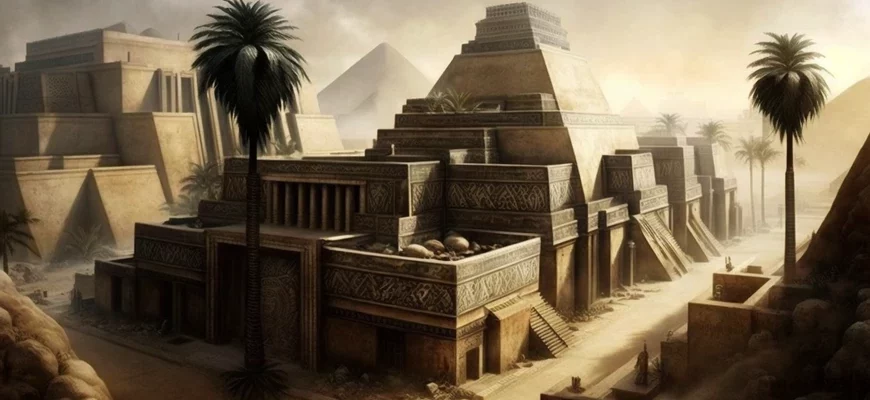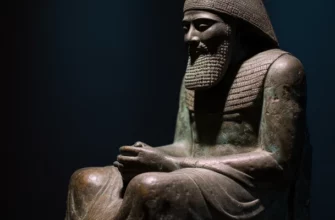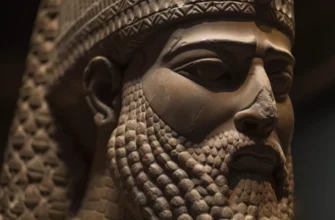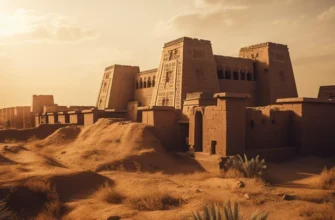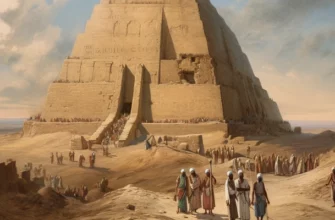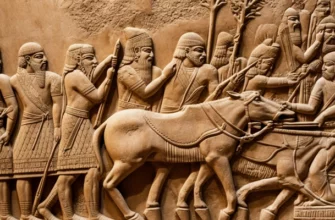The ancient Sumerians were one of the oldest civilizations in the world, existing in Mesopotamia more than 5,000 years ago. The Sumerians invented writing, which consisted of pictograms and cuneiform, and developed a calendar that was used for many centuries. The Sumerian culture was rich and diverse, their religion was polytheistic and based on the cult of the underworld and natural phenomena. Sumerian achievements in architecture and mathematics influenced the development of science and culture as a whole. Today, the study of the culture and achievements of the ancient Sumerians continues.
Historical overview
The ancient Sumerians were one of the oldest civilizations in the world, existing in Mesopotamia between the Tigris and Euphrates rivers more than 5,000 years ago. The Sumerians were among the first peoples to settle in this area and became the founders of the first state in human history.
The invention of writing was one of the most important achievements of the Sumerians. They used pictograms and cuneiform to record their language. Sumerian writing is one of the oldest in human history and was used for many centuries.
The Sumerians also developed a calendar consisting of 12 months of 30 days each, as well as an additional month added each year to align the lunar and solar calendars.
Sumerian culture was very diverse and rich. They believed in a polytheistic religion, where each god was responsible for a specific area of life. The Sumerians developed arts such as ceramics, sculpture, weaving, music, and dance.
Sumerian architecture was also highly developed. They built large temples and palaces using stone, clay, and wood. One of the most famous monuments of Sumerian architecture is the Ziggurat, which was over 90 meters high.
The Sumerians made a great contribution to the development of mathematics, the study of geometry, and algebra. They used a base-60 number system, which is still used today
in the form of 60 seconds in a minute and 60 minutes in an hour.
The Sumerians also developed trade and were one of the first peoples to use money to exchange goods. They minted copper coins with an image of a god on one side and weight symbols on the other.
The Sumerian civilization declined around 2000 BC, but its influence on the modern world remains significant. Many of the inventions and achievements of the Sumerians were adopted by subsequent civilizations, and their culture and history have been preserved thanks to the information recorded in their ancient writings. Today, research into ancient Sumer continues, and we continue to study and improve our history and our world.
Culture and Religion
The culture and religion of the ancient Sumerians were very complex and developed. They believed in many gods, each of whom was responsible for different aspects of life, such as agriculture, war, crafts, and more. The Sumerian gods were depicted in human form with animal features and were endowed with their own characteristics and powers.
Sumerian culture is known for its monumental buildings, such as ziggurats, terraced pyramids, and city-states, which had a complex hierarchy and administrative system. In the field of art, Sumerian craftsmen are known for their ceramics, metalwork, and woodwork. Their complex painting and engraving techniques influenced the art of subsequent civilizations.
Sumerian culture and religion were inseparable, and many of their myths and legends had deep religious significance. For example, the myth of the god Enki, who created humanity from clay, emphasized the importance of human labor and the high value placed on craftsmanship. The Sumerians also performed various religious rituals and sacrifices associated with different gods and events.
All these aspects of the culture and religion of the ancient Sumerians help us to better understand their worldview and way of life. They became an important part of world history and contributed to the development of human civilization.
Examples of achievements in various fields
The ancient Sumerians were pioneers in many fields that had a great impact on the development of human civilization. Some of the most famous achievements of the ancient Sumerians include:
Writing system: The Sumerians developed their own writing system, which they called cuneiform. This writing system was one of the first in the world, and it gave rise to the development of literacy, which later allowed knowledge and information to be preserved over the centuries.
Agriculture: The Sumerians were the first to use irrigation systems to make their fields more productive. They also invented agricultural tools such as axes and scythes, which allowed them to use the land more efficiently.
Architecture: The Sumerians built many impressive structures, such as ziggurats and city-states. They also invented stepped pyramids and used complex engineering techniques to construct large buildings.
Crafts: Sumerian craftsmen were very skilled and talented. They made complex items from ceramics, metal, and wood that demonstrated their craftsmanship and knowledge.
Trade: The Sumerians were well versed in trade and used their knowledge of agriculture to create a powerful economy. They also developed trade with other civilizations, which allowed them to obtain valuable goods and commodities that were not available in their own lands.
Mathematics: The Sumerians introduced the use of numbers and the number system. They created an accounting system that allowed them to keep records of goods and services. Sumerian mathematicians also invented geometry and trigonometry.
Medicine: The Sumerians developed the first medical techniques and medicines that were used to treat various diseases. They studied human organs and internal systems, and their knowledge and treatment methods are still used today.
The Sumerians were the first to understand that it is important not only to preserve knowledge, but also to disseminate and share it. They developed their knowledge and skills in various fields, which contributed to the development of civilization and the strengthening of their state. Today, we are still learning a lot from the history of Sumer, and their achievements remain an immeasurable spiritual treasure for the whole world.
Economy and social structure
The economy and social structure of the ancient Sumerians were interrelated and quite complex. The Sumerians were one of the first civilizations to develop in Mesopotamia, and they produced a variety of goods, such as textiles, ceramics, gold and silver jewelry, and other items. With the development of trade, they also developed an accounting system and used various types of money, including silver and gold coins, as well as silk pieces, pearls, copper plates, and other goods.
The Sumerian economy was based on a system of trade and exchange of goods. Only a small part of the population was engaged in agriculture, while the majority worked in trade and other crafts. In addition, Sumer had a developed system of craftsmanship, and many people worked in the textile, ceramic, and metallurgical industries. The social structure was quite complex, and people were divided into classes according to their profession and status. The government of Sumer was headed by a king, who was considered a kind of god on earth, and the most famous cities were divided into different states.
There was a high degree of equality among citizens in Sumer, and people had the right to freedom of speech and religious freedom. However, as in many other ancient civilizations, there was some inequality between men and women in Sumerian society.
In particular, women had fewer opportunities in politics and power and usually held positions in the household. Nevertheless, women were very important in Sumerian culture and religion, and many of the gods and goddesses worshipped by the Sumerians were female.
There were also some negative aspects to the Sumerian economy and social structure, such as slavery and dependency. Slavery was common, and slaves were typically used in agriculture or crafts. Dependency on rulers and powerful individuals was also common, and people’s opportunities for wealth and success were limited by their social status.
Nevertheless, Sumerian civilization is of great importance in human history, as it was one of the first in the world to develop at the city level and preserve its achievements and culture for millennia. Many innovations, inventions, and technologies that appeared in Sumer were transferred to other parts of the world and became the basis for further development.
The role of the Sumerians in world history
The role of the Sumerians in world history was significant, as this civilization provided many achievements that became the basis for the further development of humanity. The Sumerians were the first to develop a writing system, which was the first step in the creation of advanced civilizations.
Sumerian culture and religion also had a major impact on world history. Sumerian gods and goddesses became the basis for the mythology and religion of many peoples, and some of their technologies and inventions, such as the wheel and the calendar, influenced the further development of civilizations.
In addition, the Sumerian economy was the basis for the creation of advanced trading systems and monetary currencies, which later became important factors in the development of the global economy.
All this shows that Sumerian civilization had a great influence on world history and became one of the most significant sources for the development of other civilizations. The Sumerians preserved their heritage for millennia, and their achievements continue to influence humanity to this day.
Contemporary influence and legacy
Although the Sumerian civilization disappeared more than 4,000 years ago, its influence on the modern world is still felt. Sumerian writing became the basis for many other writing systems, and some of their inventions and technologies, such as the wheel, calendar, and water supply systems, are still in use today.
Sumerian mythology and religion have been a source of inspiration for many artists, writers, and filmmakers. Many of these ideas, characters, and motifs can be found in the modern cultural context.
In economics and business, Sumerian ideas and methods are used in research and analysis to understand the development of the economy in early human history and to identify principles that may be useful for businesses in the modern world.
Thus, the ancient Sumerians have a great legacy that is evident in various areas of modern life. Studying their history and achievements can help to better understand the development of human civilization and inspire new ideas and inventions.
